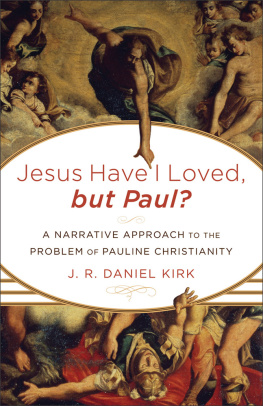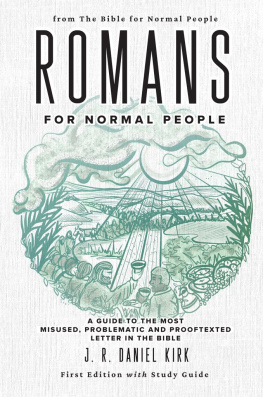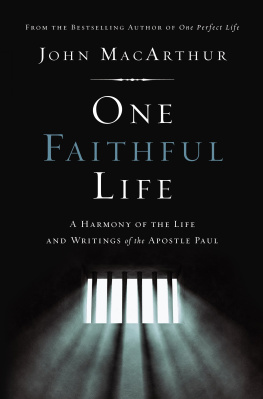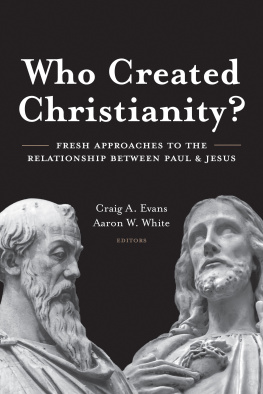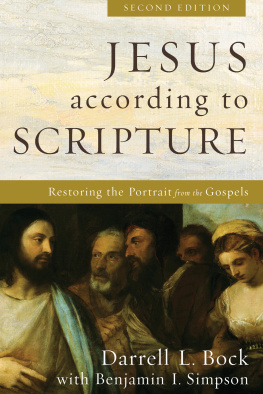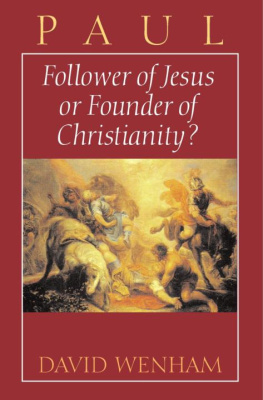There are many people to thank, without whom this book either would not have come to fruition or else would be greatly impoverished.
I was aided and abetted by a veritable legion of readers. David Vinson faithfully read through the entire book, chapter by chapter, as it was being written, and thereby greatly improved both the content and the writing. Readers will never know how much in his debt they are. Other friends and colleagues have also provided invaluable feedback: Love Sechrest, Susie Flood, Pete Enns, Evan Curry, Alex Kirk, Brian White, Karyn Traphagen, and Mark Traphagen. Thank you all.
I want to thank John Franke, Scot McKnight, and Pete Enns for seeing the value in this project and connecting me with the folks at Baker Academic. And I wish to thank Bob Hosack for his encouragement on the project from day one. Special thanks go out to John Darnielle for permission to use the lyrics from Love Love Love that serve as the epigraph to chapter 9. Fuller Theological Seminary is my academic home, and I am thankful for its granting me a sabbatical in the fall of 2010 to complete work on this manuscript.
The energy to write the book has come from numerous conversations with people who love Jesus but have yet to meet a Paul who is largely in step with the Master. Thanks to all of you who have shared with me your intense and faithful wrestling with the biblical texts. In particular, thank you, Opa, for the conversations that gave me the passion to sit down and start writing. This book is for you.
Introduction
In a deconstruction, our lives, our beliefs, and our practices are not destroyed but forced to reform and reconfigurewhich is a risky business.
John D. Caputo, What Would Jesus Deconstruct?
Problems with Paul?
Now that Paul is out of your system, my grandfather said, how about a book on Jesus, who actually got Christianity right, rather than writing about that rascal who mucked everything up? I had just received a contract for my first book, a study of Pauls letter to the Romans. And though my grandfathers suggestion was playful, it also reflected genuine misgivings he harbors about Paul. Jesus preaches love of neighbor; Paul wants to expel the immoral brother. Jesus says, Do unto others; Paul is hung up on being a wretch.
My grandfather is not alone in these concerns. His consternation is likely due, in part, to the work of European New Testament scholarship from the early twentieth century trickling down from the ivory towers to the people on the streets. Scholars at that time gave more focused attention to Jesus and his proclamation of the kingdom of God. This led some experts on the New Testament to declare that a significant shift had occurred between Jesus and his followers. Although Jesus proclaimed the reign of God, Paul (and the early church more generally) proclaimed the reign of Jesus: The proclaimer became the proclaimed. This perspective took root outside the walls of the academy in the World War II generation of Europe and North America.
In our own day there is a resurgence of attention being paid to the Jesus of the Gospels, especially among Christians who were raised in evangelical churches. In these circles, Paul has traditionally served as the primary mouthpiece for the gospel. But this new generation is discovering afresh what scholars wrestled with a century ago: Jesus came proclaiming the reign of God, and if this is the gospel, then we need to reconsider a good deal of what we thought we knew. Why is the arrival on the scene of a wonder-working Jewish prophet good news? What does it mean for God to be at work in Jesus? Why is the life of Jesus before Calvary a gospel to be proclaimed? In the process of wrestling with Jesus, and falling in love with the figure we meet on the pages of the Gospels, many have simultaneously lost their affection for Paul.
The apostle might seem to fall short of the Master on any number of fronts. Paul seems unconcerned with the stories of Jesuss life. Related to this, some might see him as a thinker who spent too much time theologizing about Jesuss death. Others might be drawn to the activist ministry of Jesus over against a faith-alone heart religion.
Still another challenge grows out of the history of American (and Western European) Christianity. Paul gave voice to preservation of the status quo during the era of American slavery. When he is juxtaposed with the Jesus who proclaims liberty to the captive, the contrast between the early preachers is stark. Thus, particularly in scholarly circles, Paul has struggled to find a voice among some segments within African American Christianity.
The issues of race and slavery might also be seen as simply one subject under a larger umbrella of justice where Paul falls far short of Jesus. And now we are right up against the vexing issue of homosexuality, where many Christians who are affirming find an ally in Jesus that they do not find in Paul, who condemns such practice.
So if you are someone who follows Jesus but have at some point wrestled with Paul or felt some dissonance between Paul and Jesus, you are not alone. Some people find Paul lacking in comparison with the Master; others simply find Paul distasteful, offensive, oppressive, exclusive, confusing, arrogant, or just plain wrong. This book is, in part, for folks who at times find themselves resonating with the statement, Jesus have I loved, but Paul have I hated. I have been there myself.
One of my earliest memories of reading the Pauline letters is a nettled encounter with 2 Corinthians 1112. In these chapters, Paul is defending his work as an apostle, piling up language of boasting, through examples of acting foolishly, of glorying in disgraceful experiences, of weakness and visions of glory. As I read those chapters, Pauls litany of irony and boasting struck me as truly foolish and arrogant. When I first met Paul I simply did not like him.
Even when I began to appreciate Paul, however, he still caused me problems. In college I began investigating some of the classic theological questions, including the subject of predestination and issues of church government. Now, finally, the letters bearing Pauls name became my friends, because they addressed most directly the questions I was asking. But this new relationship was starting to cause discord in some of my old ones; specifically, my understanding of the church left little room for affirming my brothers parachurch ministry, and my zealous affirmation of male leadership disrupted relationships with many women in ministry, including my mother, who was ordained while I was in this stage in my theological pilgrimage. And so my relationship with the apostle continued to be uneasy.

